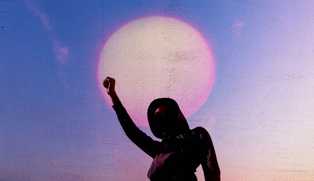We are making a collaborative documentary that celebrates the powerful environmental justice work done by people of colour in the UK.
This page explains what we’re doing, how we’re doing it, and how you can be involved. We will keep adding to it over the course of the project, so check back for updates.
Update: due to the impact of Covid we’ve been pacing ourselves, but the project is still live.
Thank you to everyone who filled out our survey of Black and POC environmental justice workers in the UK. We are processing the responses and designing the next stage of our research: facilitated conversations and workshops.
Project outline
For decades, Britain’s environmentalists of colour have organised, campaigned and taken action for the planet. To build a movement on the foundations they laid, we need to know their stories. In this film, we will meet the UK climate justice giants on whose shoulders we stand.
By shining a light on untold histories, as well as following the activists leading the fight in 2020, the film will show our key audience of young people of colour in the UK inspiring stories of campaigns fought and won by people from communities like theirs. We want young people of colour to see a place for themselves in the struggle to protect their health, security and futures – and that place is right at the front.
We intend for this film to genuinely serve people of colour in a way that so many films fail to do, particularly those that are told about communities of colour, rather than by, for and with them. Working with trained community facilitators and under the guidance of community filmmakers, we will work to create a non-extractive, participatory co-production with the individuals and communities whose stories the film platforms. Right now, we are mapping the UK’s environmental justice landscape. If you want to tell us about your work in this space, or point us to someone amazing we should speak to, please fill in our survey.
What do we mean by environmental justice?
Environmental justice frames environmental conversations, actions and solutions as ethical and political issues that are affected by things like race, socio-economic background, capitalism, colonialism, white supremacy, resource theft and extractivism.
Climate change is the perfect example: communities in the global south bear the brunt of the consequences despite contributing the least to causing it. And in countries across the global north, local environmental threats like air pollution disproportionately affect communities of colour. Climate change exacerbates existing inequalities, making the poor poorer, the sick sicker, and all vulnerable communities more vulnerable.
For our film, centring environmental justice means including conversations, actions, solutions and people that the mainstream environmental movement often excludes – from migrant rights to prison abolition, public health to indigenous knowledge.
Further reading: At the First National People of Color Environmental Leadership Summit in 1991, delegates drafted and adopted these 17 principles of Environmental Justice. Since then, the Principles have served as a defining document for the growing grassroots movement for environmental justice: https://www.nrdc.org/sites/default/files/ej-principles.pdf
Values for the film process
We are currently working on designing our methodology for the crucial research and development phase of the project. This process will lead us to our characters and stories while adhering to our core values for the film: equity, co-creation, capacity-building, transparency, and allyship. We are building an infrastructure that will ensure an equitable relationship with our participants: clear lines of communication, transparent intentions and methods, fair payment, and pathways to become meaningful stakeholders in the film.
We believe in crediting and uplifting the incredible work of others upon which we are building. So far, we are grateful to have benefitted from the work of:
This list is alive and kicking, and we will keep updating it as we move through the filmmaking process.
How you can get involved
Right now, we are mapping the UK’s environmental justice landscape. If you want to tell us about your work in this space, or point us to someone amazing we should speak to, please fill in our survey.
If you are interested in following the film’s journey, or being part of the project in any way, please send an email introducing yourself! film@skindeepmag.com
Meet the team
Anu Henriques – Director
Anu is the founder and editor-in-chief of Skin Deep, and since 2017 has worked in development and production at Fable Pictures (Wild Rose, Stan & Ollie, Rocks). For the last three years she has worked closely with Sarah Gavron as Associate Director on Rocks (2020), a collaborative film that was built from the start with the young women at the centre of the story, over a year-long R&D process which took place in schools, drama clubs, youth clubs and workshops.
Farzana Khan – Executive Producer
Farzana is a writer, director, cultural producer and award-winning arts educator. She is the Executive Director and Co-founder of Healing Justice London (HJL) Her practice works on building community health, repair and self-transformation rooted in disability justice, survivor work and trauma-informed practice working with communities of colour and other marginalised groups. Farzana has a background in Youth and Community work particularly focused on arts-based education projects both in the UK and internationally. Farzana is the former creative and strategic director at Voices that Shake, bringing together young people, artists and campaigners to develop creative responses to social injustice. She ran this working at Platform London, a climate and social justice organisation. She currently is a lead strategist on Climate and Resource justice with Thirty Percy Foundation.
Farzana is a Fellow at the International Curatorial Forum. Farzana’s recent curatorial practice/art includes launching the Black Cultural Black Activism Map with the Stuart Hall Foundation and All Water Has Perfect Memory, writing on climate and gender justice and generational memory.
Georgie Johnson – Producer
Georgie has been an editor at Skin Deep since 2015. She is the Multimedia Editor at Unearthed, Greenpeace UK’s award-winning investigative journalism project, where she produces news videos and short docs, and commissions illustration, data visualisation and photography.
Privacy policy
We treat all the information you share with the utmost respect. We will never sell it to anyone. We will only use your contact information to keep in touch with you if you have given permission to do so, and we will never share it without your permission. We will use data from the survey for research purposes related to this film project. If we ever share insights from the survey – with fellow organisations working towards social justice, or as part of applications for funding for the film – the information will always be anonymised and show broad trends rather than specific answers. In the event we would like to use your information in any way not detailed above, we will seek your explicit permission before doing so. You can withdraw permission to use your information at any time by emailing us: film@skindeepmag.com. If you have any questions about privacy, please don’t hesitate to email us at the same address.




